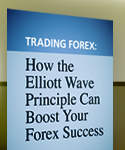Why Stock Market Investors Should Expect the Unexpected
Read our forecast for a market rally in the wake of Brexit
Investors who jump on “sure things” in the stock market usually lick their wounds with regret.
The decision of British voters to leave the European Union appeared to represent low-hanging fruit to short sellers.
After the June 23 vote, the Dow plummeted 610 points on June 24 and tumbled another 261 points the next trading session on June 27.
Even professional investors thought the stock market pain would persist. A June 27 Wall Street Journal article focused on Brexit:
“This is likely to be a fairly prolonged process that unfortunately is going to be a bit of a messy negotiation — that’s not great for asset prices alone,” said [a] portfolio manager at Fidelity Investments.
But, contrary to popular belief, we’ve observed that events — even historical ones like Britain’s decision to leave the EU — do not govern the market’s trend. Instead, the market’s price pattern unfolds according to the Wave Principle, which provides a detailed model for how investors behave.
Based on the Wave Principle, our June 29 Short Term Update said:
Monday’s [June 27] low marks the end of the pullback from the April-June highs in the Dow and S&P 500. The next Minor-degree advance is starting … .
The next day, June 30, the Dow ended the session up 235 points, which carried the index to its fifth straight higher monthly close.
Later that evening, a CNBC headline quoted one of its well-known hosts:
This rally wasn’t supposed to happen
The article goes on to say:
Suddenly out of nowhere — after a Brexit was supposed to create a disaster in the stock market — acquirers came out of the woodwork to spend billions to buy other companies, which crushed the short-sellers.
Indeed, July 1 was another positive day for the Dow with the senior index closing up 19.
Elliott wave-minded investors have learned to expect what takes the majority of investors by surprise.
The July Elliott Wave Financial Forecast says:
The coming month could be a big one for the stock market.
|
Learn the Why, What and How of Elliott Wave Analysis Financial media use news and economic events to explain market moves. Steer clear of this misguided approach. Learn what really moves the markets with The Elliott Wave Crash Course. In this series of three FREE videos, Senior Tutorial Instructor Wayne Gorman demolishes the widely held notion that news drives the markets. Each video will provide a basis for using Elliott wave analysis in your own trading and investing decisions. |
This article was syndicated by Elliott Wave International and was originally published under the headline Why Stock Market Investors Should Expect the Unexpected. EWI is the world’s largest market forecasting firm. Its staff of full-time analysts led by Chartered Market Technician Robert Prechter provides 24-hour-a-day market analysis to institutional and private investors around the world.
Brexit and Beyond — Look at Price Patterns, not Market News
How Elliott waves helped us get bearish on the British pound days ahead of vote
Jim Martens, editor of Currency Pro Service, prepared his subscribers early for the violent reversal and historic sell-off in the British pound. Learn what helped him do it.
|
Trading Forex: How the Elliott Wave Principle Can Boost Your Forex Success Learn how to put the power of the Wave Principle to work in your forex trading with this free, 14-page eBook. EWI’s Senior Currency Strategist, Jim Martens, shares actionable trading lessons and tips to help you find the best opportunities in the FX markets you follow. |
This article was syndicated by Elliott Wave International and was originally published under the headline Brexit and Beyond — Look at Price Patterns, not Market News. EWI is the world’s largest market forecasting firm. Its staff of full-time analysts led by Chartered Market Technician Robert Prechter provides 24-hour-a-day market analysis to institutional and private investors around the world.

